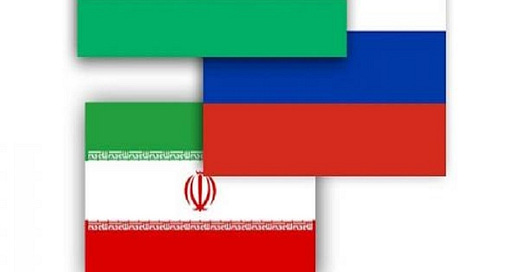Korybko To Azerbaijani Media: Russia & Iran’s Differences With Baku Aren’t Insurmountable
Here’s the full interview that I gave to Azerbaijani journalist Tehran Orucoglu, excerpts of which were published at his country’s Bizim.Media and Turkey’s Gdh.Digital.
1. Russia-Azerbaijani relations are experiencing some tension. Mr. Putin noted that the peace agreement will be concluded with the wishes and proposals of the Armenians living in Karabakh. This is not accepted unambiguously in Azerbaijan. Rearming of peacekeepers is also mentioned. In general, who is Russia with on the Karabakh issue? Can we say that there is tension in relations with Azerbaijan?
Russia must surmount several challenges connected to resolving the Karabakh Conflict. The first is to continue credibly advancing its official position in line with international law that the region is universally recognized as Azerbaijan and therefore solely under Baku’s writ. The second is to do the aforesaid cautiously enough that Russia doesn’t inadvertently scare Armenia away from the CSTO and thus throw it into NATO’s arms, which would destabilize the region’s security for all stakeholders. And finally, Russia must also manage public opinion, which is generally more in favor of Armenia.
To this end, Moscow sought to share what its strategists regarded as a balanced solution aimed at compromising between these three interests. This explains why President Putin extended support for the Armenians living in Karabakh while nevertheless maintaining that the region is Azerbaijani. Predicting that this pragmatic stance from the perspective of Russia’s earlier mentioned interests nevertheless likely won’t resolve the impasse, Moscow appears to expect that its peacekeeper mission might be continued beyond its envisaged expiry, ergo the talk about rearming those forces.
It wouldn’t be accurate to describe Russian-Azerbaijani tensions as characterized by any sort of tension, though there are some domestic and external forces with an interest in presenting them as such. The reality is that these two partners have somewhat different visions for sustainably resolving the Karabakh Conflict, each of which are aligned with their respective interests, but neither of which are consciously aimed at eroding or endangering the other’s. The greatest challenge is that Russia doesn’t have enough influence over Armenia to encourage it to completely accept Azerbaijan’s writ over the region.
Yerevan has tried over the past decade and especially under Pashinyan to “decouple” and diversify from its hitherto disproportionate dependence on Moscow, to which end it began actively engaging with Paris and other stakeholders in the Karabakh Conflict. Moreover, the Western- (and especially American- and French-) based Armenia diaspora exerts outsized influence over the present Armenian leadership, aggressively pressuring them to pursue the most extreme and recalcitrant positions towards the issue. Unless this changes, which is difficult and thus unlikely, Russian influence will remain limited.
In that scenario, no change in Moscow’s approach to the conflict is expected since such presently serves its interests with respect to surmounting the three challenges that were previously touched upon. Baku should acknowledge the difficult position that its partner is in, though that doesn’t mean that it has to accept its proposed solutions that contradict its own interests. Just like Russia is carefully balancing between Armenia and Azerbaijan, so too should Azerbaijan balance between Russia and Turkiye, taking care not to unwittingly worsen ties with Moscow over any sensitive disagreements such as this one.
2. You know that Iran intends to wage war against Azerbaijan. Exercises and many provocations on the border have been revealed. Can there be a total war? Will Russia and USA support Azerbaijan in case of war?
The conclusion that Iran intends to wage war against Azerbaijan is an interpretation of its military posturing, political interests, and strategic goals, not an official statement of intent from Tehran, to be clear. That said, there’s also no denying that the aforementioned three factors have recently contributed to the perception among some shared in the preceding question. The Islamic Republic is unlikely to initiate a conventional conflict, though, for several reasons.
First, recent domestic unrest could complicate its warfighting capabilities behind the front lines. Second, Iran relies on safe transit across the Caspian Sea to strengthen the rapidly growing economic dimension of its strategic relations with Russia. Third, any conventional conflict that it participates in along its immediate periphery could take away from its deterrence capabilities along others, meaning that waging war against Azerbaijan could weaken its defenses along the Gulf.
In the event that a conventional conflict erupts, regardless of who’s to blame and why each side officially says that they’re fighting, Russia is expected to remain neutral. To that end, they might even continue selling arms to both sides exactly as they did to Armenia and Azerbaijan despite those two being heated rivals over the past few decades. The US, meanwhile, would obviously extend political support for Azerbaijan but might be reluctant to do so militarily due to logistical limitations.
Moreover, America could be expected to rely on NATO-ally Turkiye to “Lead From The Front” in this respect since it has a natural interest in supporting Azerbaijan. Nevertheless, even Ankara might be reluctant to get officially drawn into a conventional conflict with Tehran for various reasons, mostly related to regional anti-terrorist, energy, and Eurasian-wide logistical concerns connected to the possibility of expanding trade with China and South Asia via the neighboring Islamic Republic.
The best-case scenario is that Azerbaijan and Iran candidly discuss their respective problems with one another behind closed doors at the leadership level and among their permanent military, intelligence, and diplomatic bureaucracies. A conventional conflict between them would only divide-and-rule the region to the benefit of extra-regional players like the US, which has a self-interested stake in pursuing that outcome for proxy war pursues vis a vis Iran but also against Russia and China to an extent too.
Excerpts from this interview were published at Azerbaijan’s Bizim.Media and Turkey’s Gdh.Digital.




